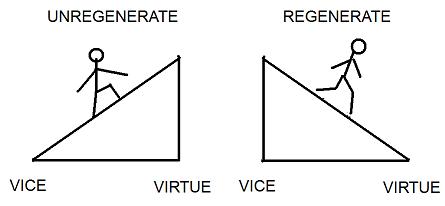
Reformed - Distinguishing Whether or Not a Person is a Child of GodThe Inductive Approach
Keswickian - Distinguishing Carnal Saints from "Spiritual" Saints
The Semantics of Biblical Greek Grammar
PRESENT TENSE (P) =
That which is CHARACTERISTIC of a person's LIFESTYLE, "A Matter
of Course", or a PROCESS. English example: "You always
do that!"
AORIST TENSE (A) = Point in time EVENT (such as an historical
event, or at this present instance) or that which occurs
OCCASIONALLY but UNCHARACTERISTICALLY
PERFECT TENSE (R) = That which occured in the past with results
experienced in the present.
The Present Tense uses words not intended to be subject to boundary conditions
Examples in English: Just about any Virtue or Vice, Maturity, Intelligence, anything which is a matter of degree.The Predictability of Present versus Aorist
Illustrations: Flip a Coin, Probability Curves
Characteristic Behavior of the Unregenerate - (Unsaved)
Eph 2:3 All of us also lived (A) among them at one time, gratifying (P) the cravings of our sinful nature and following its desires and thoughts. Like the rest, we were by nature objects of wrath.Characteristic Behavior of the Regenerate - (Born Again, Children of God, Saved)
1John 3:9,10 Whoever has been born of God does not live a lifestyle of sin, for His seed characteristically dwells in him; indeed he doesn't have the ability in himself to live a lifestyle of sin, because he has been born of God. In this the children of God and the children of the devil are being revealed: Whoever does not characteristically do righteousness is not of God, nor is he who does not characteristically love his brother.

Rom 1:26,28Backsliding: 2Peter 2:20-22
Gal 5:16-21